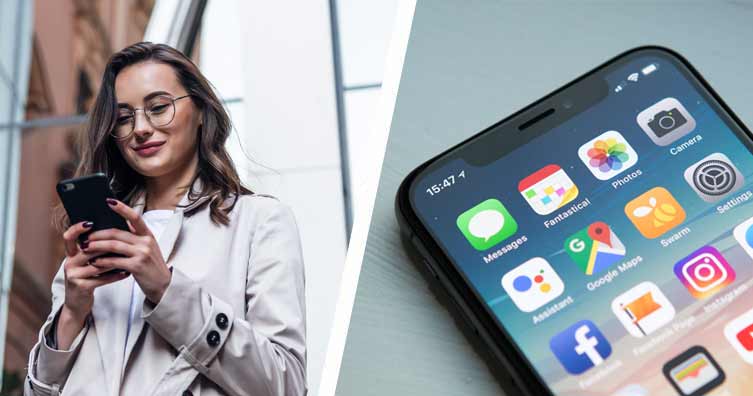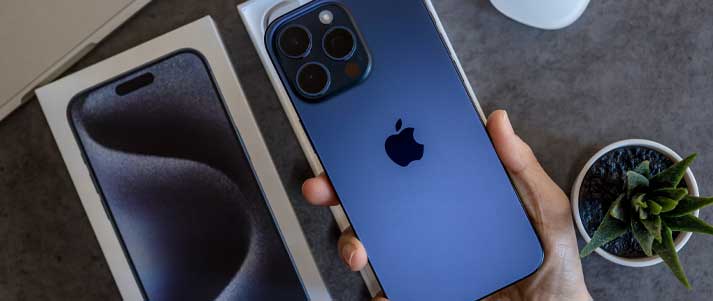17 ways to get the best mobile phone contract
There are so many networks and contracts to choose from these days, how do you know if you're getting the best mobile phone deal? We'll show you the ropes.

Credit: Petryshak – Shutterstock
With so many different elements to consider with your phone contract – minutes, data, overseas charges and more – it's hard to know where to start.
But finding the right mobile phone contract to suit your needs can save you up to £50 a month, so it's important to get it right.
To help you out, we've put together all our favourite apps and insider knowledge to save money on your phone bill. This way, you can get the best deal – and avoid scary hidden charges.
Can a student get a phone contract?
Yes, anybody over 18 can get a mobile phone contract. All you need is proof of identity, proof of a UK address, and a UK bank account. But keep in mind that some phone companies also perform a credit check.
If you're an international student, it may not be worth getting a phone contract. It depends on how long you're planning to stay in the UK since most contracts lock you in for at least 12 months. It can also be tough to pass the credit checks if you only recently opened your international student bank account. But it's always possible to get a pay-as-you-go phone.
How to get the best phone deal
These are the best ways to get a good mobile phone contract:
-
Keep track of your mobile minutes, text and data
It can be tempting to just pick the cheapest deal you can find to save some money, and sometimes that is the best course of action. But thanks to penalty charges, it's often not the case with phone contracts.
If you use more than your allocated amount of data, minutes or texts, you could be stung by some seriously steep fees.
So, work out how much you need and how much you use, and go from there.
These days, people don't usually reach their text and minute limits but consider these allowances if you use them a lot. If you send 1,000 texts each month, don't go for a contract with only 500 just because it's a couple of quid cheaper. Chances are that the penalty charges would amount to far, far more than a slightly more expensive contract.
Similarly, however, you shouldn't go for a contract with way more than you need. Although a large number of contracts nowadays come with unlimited texts and calls, not all do. Checking out those that don't could be a great way to save money if you're not a big texter/caller.
Our Communications Director, Tom Allingham, shares his experience:

I never usually call people, but one month during uni I had a couple of group projects on the go and had a few extended calls to sort some things out.
I only had 100 minutes on my contract, and as I'd never even gone close to the limit before, it didn't cross my mind that I could be maxing it out.
Come the end of the month, and my usage on a contract that usually charged £25/month amounted to a whopping £109.
Moral of the story: remember what is and isn't included in your contract.
-
How much data do you need on your contract?
Your data allowance is probably the worst one to exceed. Not only are the charges extortionate, but it's incredibly easy to use data without realising it.
Use the settings on your phone to establish which apps tend to use up the most data and avoid using them as much as possible when you're out and about.
You can also set apps to only work when connected to a WiFi network. This will save you a bucketload if you find your data is wasting away. We'd particularly recommend using this setting for apps like Spotify and Netflix, which can sap your data allowance a lot quicker than you'd realise.
Some phones will even disconnect from WiFi after a period of inactivity, so if you have a small data allowance, consider turning your data off whenever you're connected to WiFi.
As for how much data to sign up for, most users will find that around 5GB is enough. But if you plan on streaming content or watching TV on your phone, go for an unlimited data deal or one that offers at least 10GB per month.
-
Get cheap mobile phone insurance

Credit: Jan Faukner – Shutterstock
When you're carrying a £500+ smartphone around with you everywhere you go, it's nice to know that it's covered in case of an accident.
Many phone insurance companies will sell you what they call a 'comprehensive' insurance package for between £8 to £15 per month. But when it comes to the crunch, some firms will find all manner of excuses to avoid paying out.
Our advice? First of all, check whether your phone is covered under your student contents insurance before taking out a phone insurance policy.
If you're not covered, read our guide to finding the best mobile phone insurance. You'd be surprised to see that you could get coverage for just a few quid a month.
-
Phone contracts with cashback offers
Increasingly, sites such as Mobiles.co.uk and e2save.com have started offering cashback deals with their contracts. These deals are legit, but how easy it is to get your cashback can depend on the type being offered.
'Cashback by redemption' (or anything with a similar name) is the one to watch out for, as this often means you'll have to send in monthly bill statements to claim your cashback.
It's much easier to go for deals with 'instant cashback' or get your cashback as a lump sum by going through a cashback website like TopCashback or Quidco. You can check out our guide to using cashback sites for more details.
In this instance, no action is needed from you, aside from clicking on the right link. You could get well over £100 in free money if you're lucky – not to be sniffed at.
-
Choose the best length contract
No one wants to be tied into a phone contract for the long haul. But in order to get a good deal, networks will sometimes expect you to sign up for a set number of months (normally at least a year).
It's true that you can get rolling contracts with no commitment, but this is only possible with SIM only deals.
Most networks will offer you the choice of 12, 18, 24 or 36-month contracts, with the monthly cost for equivalent allowances decreasing as the length of the contract increases.
It's all about striking a balance. While cheaper is obviously more appealing, you don't want to be tied in forever in case your circumstances change.
A good compromise could be to stick to an 18 or 24-month contract. This will give you the rewards of a slightly cheaper contract while limiting your contract term to give you that all-important flexibility should it be necessary.
-
Find a deal with reduced overseas tariffs
If you reckon you'll be going abroad at any point during your contract period (and even if you're not planning a trip right now, 36 months is a long time – you might!), beware that data roaming can cost way more than your usual tariff.
While some providers don't charge you for using your phone in Europe, using it outside of the EU can involve some hefty additional costs. And, thanks to Brexit, there's now no legal guarantee that your network won't reintroduce roaming charges for using data on the continent. Most already have!
These overseas tariffs apply if you make a lot of international calls too (for example, if you have friends or family who live abroad). Scout out each network's relevant charges before you commit and, if necessary, check out some cheaper ways to make international calls.
-
Consider SIM only contracts

If you've already got a decent phone and aren't that bothered about upgrading to the latest and greatest model, there's nothing to stop you from keeping it and switching to a SIM only deal. Just remember, you may need to unlock your phone if you want to use it with a network other than the one you bought it with.
If you do need a new phone but don't want to pay through the nose for it, another option is to head to eBay. You can find iPhones in great nick being sold for as little as £45. Of course, it always helps if you use our eBay shopping hacks.
Or, you could consider buying a refurbished phone. These are second-hand devices that have been tested to ensure they still work like new, but they still cost a whole lot less than a new handset.
The trick is to wait until a new fancy model has just been released, as people will be desperately trying to flog their current phones for the newest model.
Anyway, as you're not paying for the phone itself with a SIM only contract, you can net some serious savings. There are loads of decent contracts that come in at under a tenner a month.
To work out what your cheapest option is, you'll need to consider the lifetime cost of a phone and the contract.
Say the best deal for a phone you wanted was £38/month for 24 months. At the end of the contract, you'd have spent £912. Use tools like Idealo to see how cheap you can find the phone for by itself, and then find a SIM only deal with equivalent minutes, texts and data.
Add together the cost of the phone and the SIM only contract and see how it compares to the bundle – it'll usually be cheaper.
-
Which mobile network is the best?
Mobile phone signal varies hugely throughout the UK, and some networks offer much better signal than others in certain areas.
Ofcom has a mobile network coverage checker that you can use to see which networks are working best in your area, but you may find it's just as effective to ask friends and family who live nearby how they find it on their network.
While it's also good to do a bit of research on the customer service rating of each brand, we'd recommend steering clear of the likes of Trustpilot on this one – pretty much every mobile phone network has an awful rating! It seems as though in this case, more than any other, people are only leaving reviews when they're seriously annoyed.
-
Ask your network for a better phone contract
If your contract is coming to an end, it's likely you've heard from your network offering you an upgrade to a new phone. Remember that they might not get in touch about this – best get checking if you're due one.
You have a few options at this stage: either upgrade, stick with your current phone model and ask to switch to a SIM only plan, or switch to a different network altogether.
You could also stick with your current phone and current contract, but this is the biggest waste of money imaginable. Remember that across your contract, you'll be paying off the cost of your phone (usually at an already-inflated cost). Continuing to pay it after the fixed term is up is just throwing money away.
Now, while you may shy away at the thought of negotiating with your network, we have this great guide on how to haggle that will help you master the art. And bear in mind that this is the prime time to make serious savings on your contract, so you won't want to miss this chance.
From a network's point of view, having you pay slightly less on your contract is better than you paying money to another company, so they're very willing to listen to your demands.
What is the best time to get a phone contract?
We're not 100% sure how true this is, but rumour has it that calling up and haggling at the beginning of the month brings the biggest rewards.
Customer service staff apparently have a pot of money that they can use to offer customers better deals and, by the end of the month, this pot runs dry. By calling up early in the month, you'll be catching them when they have more money to play with.
Again, we're not entirely convinced with this one, but you've quite literally got nothing to lose and everything to gain by trying.
-
Go online for the best phone contract deals

Credit: Olena Yakobchuk – Shutterstock
If you've ever been to a mobile phone shop on the high street, it's likely that you've been targeted by commission-hungry sales staff.
Shopping online can relieve you of any pressure to make quick (and sometimes wrong) decisions, and there are plenty of helpful websites out there to point you in the right direction (including Save the Student, of course).
Occasionally our student deals page will have phone contract deals to check out too, so be sure to have a peek.
Got a phone you're keen to sell? Find out how much your old mobile is worth. -
Use mobile phone comparison tools
As with pretty much anything you can buy online, there are sites to help you find the best deal.
Of course, you can easily do your own research. We would highly recommend doing that as well, since not all networks will appear on comparison sites. But there's no harm in paying a visit to some of the best comparison sites to see what they have to offer.
Luckily, we also have our own mobile phone contract comparison tool for you to try – make sure you give it a look before you head anywhere else.
-
Use apps that reduce your phone bill
This doesn't strictly apply to finding the best contract, but there are loads of apps out there that help you reduce the texts, minutes or data you use, meaning you could potentially commit to a smaller contract.
Look out for O2 WiFi hotspots when you're out and about to cut down your data usage (even if you're not with O2). Or, if you're on EE Mobile or have EE broadband at home, the EE WiFi app does the same.
Then there's Airtime Rewards. This app works similarly to a cashback app, except the money you earn from making purchases gets knocked off your phone bill each month instead.
The app features loads of popular shops including Boots, Gregs and Argos, and unlike online cashback, you don't need to do anything other than shop with the card you've registered.
We have loads more apps for you to check out in our guide to the best money-saving apps. -
Go with smaller phone networks
The mobile phone sector is filled with big players, but don't be afraid to step outside of these and go for a smaller network. GiffGaff offers some good contract deals with the added benefit of not getting locked in, which can be good for students.
The likes of iD Mobile (owned by Currys), VOXI, and Smarty are also getting in on the act with some great deals.
Best of all, these new networks almost always piggyback onto the service offered by one of the major players, so you know you'll have some half-decent coverage (iD Mobile, for example, uses Three's network).
-
Look out for network-exclusive deals and freebies
You've probably heard of O2 Priority, but did you know that it's not the only network offering exclusive deals to its customers?
Vodafone has waded in with VeryMe, which offers things like cheap cinema viewings and the chance to win free festival tickets.
Beyond this, you can sometimes get a 'freebie' thrown in when you take out your contract.
Sometimes the 'freebies' are genuinely high-value goods, like a PS5, but beware: often the contract will be disproportionately overpriced for what the phone and minutes/data/texts are. In other words, you could end up paying for the 'freebie' through your inflated contract.
And, as ever, check out our deals section for all the latest deals from O2 Priority, VeryMe and everywhere else.
-
Choose an ethical mobile network
Maybe unsurprisingly, but technology is responsible for a lot of greenhouse gases. So what if there was a way to cut your carbon footprint and save money at the same time?
Honest Mobile has a solution for this. They are the world's first carbon-negative mobile network and donate 1% of their annual revenue to fight climate change.
Apart from helping you to reduce your carbon footprint, they also reward you for your loyalty. Every month you continue to use Honest Mobile, you build up loyalty discounts. With it, you can eventually save up to 30% on your monthly bill.
With free EU roaming (for up to five days per trip), fast 5G and real-time notifications to help you up or downgrade your plan if necessary, Honest Mobile is definitely one to consider.
-
Trade in your old phone

Credit: LittlePigPower - Shutterstock
Not only is this better for the planet, but trading in your old phone is a good way to get your new one for a fraction of the price.
Most of the big names (such as Vodafone, EE and Carphone Warehouse) will let you do this and you could save a decent amount of money.
However, it's worth noting that what they pay out will vary a lot. This is typically based on its condition and the make and model of the phone.
Before you recycle your old device, make sure you back up the precious photos, videos, contacts and messages that you don't want to lose.
-
Set a spending cap
Another way to avoid being overcharged for your phone contract is to set a spending cap. You can do this by either logging into your online account or contacting your provider.
With a cap, you can prevent being charged high fees if you accidentally go over your allowance of calls, texts or data.
If you're going for an upgrade, find out how much money you can get for selling your old mobile phone.








